Inside: Use these tips for decluttering with health challenges to help you start making more progress.
Have you been feeling overwhelmed by the state of your space? Are you sick and tired of being overwhelmed by uncontrolled clutter?
All you need to do is roll up your sleeves and get to work… right?
That’s easier said than done when you’re dealing with health challenges.
Whether those challenges are physical or mental – or in some cases, both – they make the task of decluttering significantly more difficult to accomplish. But while decluttering with health challenges is hard, it doesn’t have to be impossible.
By approaching the task in a way that works for you, you’ll find that you’re able to clear the clutter out of your space – even if you’re facing limitations that make that task more challenging than it should be.
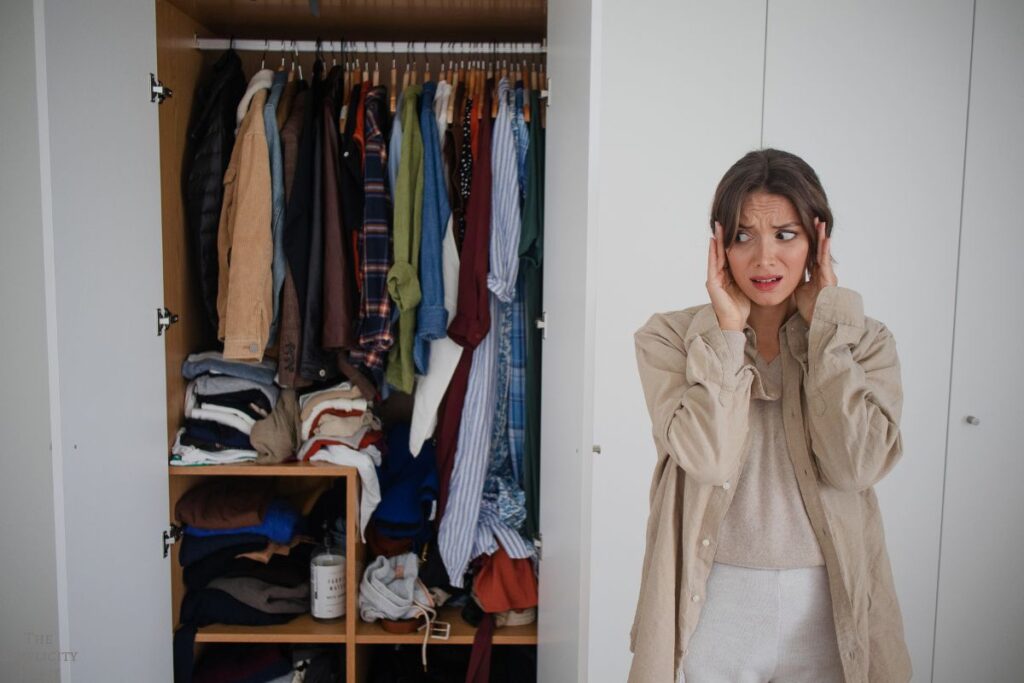
Why does decluttering with health challenges feel so hard?
Many of us face health challenges that add an extra layer of complexity to many of our everyday tasks. Dealing with physical limitations, fighting chronic pain, or managing conditions that impact your mindset and ability to focus can be difficult – to put it lightly.
When you’re facing physical limitations or dealing with ever-present pain, simple tasks can be much harder to accomplish – if not literally impossible.
Mobility limitations can make it challenging to access all the spots that need attention in your home, and chronic pain can significantly limit the amount of time and energy you can afford to spend on the task at hand.
Mental health challenges can pose just as many complications to the decluttering process. ADD can make it difficult, if not impossible, to stay focused on the task at hand for any meaningful length of time.
Anxiety can leave you so overwhelmed that you can’t even figure out where to begin the decluttering process.
And depression can make it difficult to even get out of bed and complete the most basic of tasks; the idea of rolling up your sleeves and spending hours sorting through old stuff can be completely outside the realm of possibility.
But there’s good news – you don’t have to suffer at the mercy of your clutter because you’re dealing with health challenges.
There are ways to adapt, overcome, and ultimately accomplish your goal of decluttering your space. You might just need to take a different approach to make it happen.
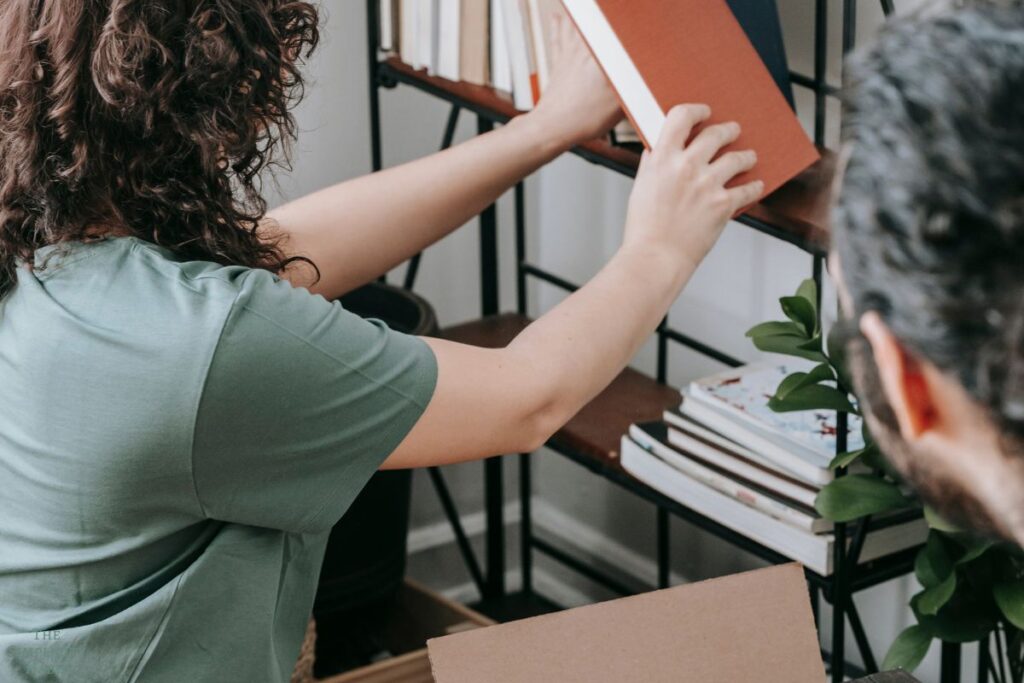
Decluttering with Health Challenges: 4 Tips To Help You Cut Through Clutter and Organize Your Space
Tired of living with all of that clutter? Ready to make a change and clear it out? Here are a few tips to keep in mind as you navigate the decluttering process.
1. Take it slow.
While some people prefer the marathon-style approach of working for hours and decluttering everything at once, that might not work for you – and that’s completely fine.
It’s totally OK to acknowledge any limitations you might be facing and adjust accordingly. You may not be able to totally overhaul your space in a single weekend.
You might need to take weeks, months, or even years to accomplish your goals. And that’s absolutely acceptable. Adjusting your expectations is going to be part of the process.
After all, decluttering isn’t a competition. The last thing you want to do is leave yourself physically injured or mentally overwhelmed and exhausted.
Even if you’re limited to tackling your clutter in five-minute stretches, you can absolutely make good progress in that amount of time. And when you add up all of those little decluttering sessions, at the end you’re going to find you accomplished your goal.
Don’t compare your progress with anyone else’s. It’s important to remember that this is your own journey. It’s ok if it doesn’t look like anyone else’s and if you need a longer timeline.

2. Set realistic goals as you go.
The idea of tackling all of your clutter at once might be completely overwhelming. That’s why it’s smart to break the task down and set some realistic goals for yourself.
By celebrating little wins along the way, you’ll be able to recognize the progress you’ve made and continue building momentum for the rest of the task at hand.
Instead of aiming to declutter your whole home, focus on a single room at first – and then think even smaller.
Want to declutter your kitchen? Great. Focus on one drawer at a time.
Want to declutter your closet? Perfect. Focus on one type of clothing at a time.
Narrowing your focus to a very small area or category will help you to make progress without feeling so overwhelmed. How do you eat an elephant? One bit at a time.
Give yourself grace and be patient. Progress is progress, no matter how small. All of the little steps eventually add up to big progress.
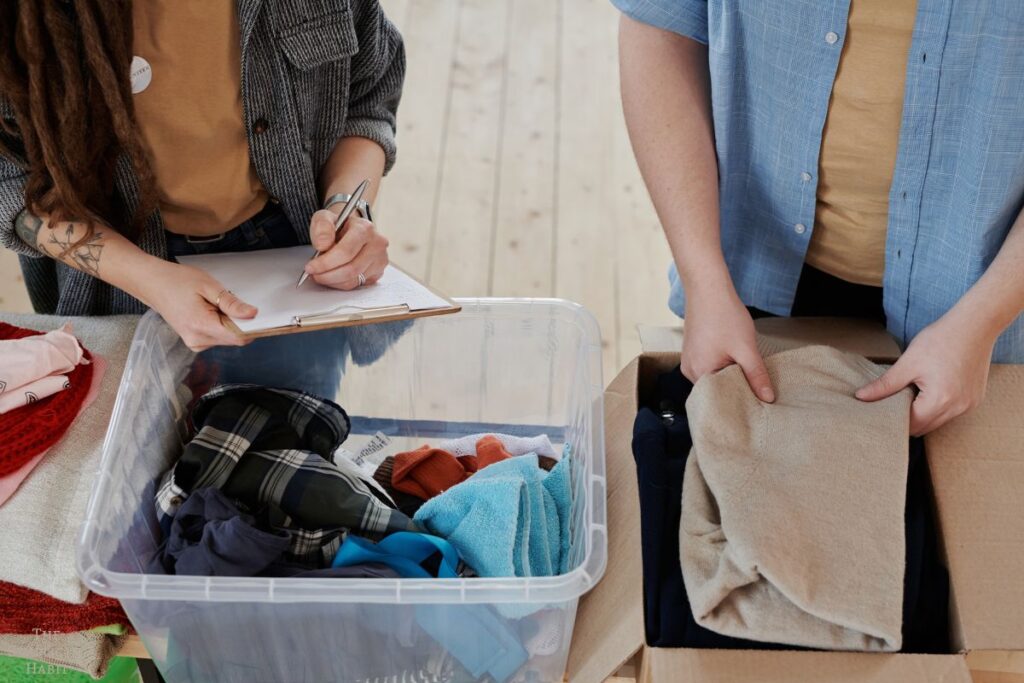
3. Don’t be afraid to ask for help.
While most of us feel like we need to declutter our space all by ourselves, for some, this isn’t realistic. There’s nothing wrong with asking for a little help.
If you can afford it, you can hire professional decluttering services to come in and help you sort through your stuff to determine what stays and what goes.
Trained professionals can help you make hard choices around what you should and shouldn’t keep, get rid of trash and items to donate, and help you to come up with systems and solutions that’ll help keep your home clutter-free for years to come.
And if hiring a pro isn’t in your plans, that’s OK! Often, friends or family members can be more than willing to roll up their sleeves and spend some time helping you make decisions or removing large or heavy items for you.
Not only does the additional help make it easier to get through the task at hand, but you’ll also have more fun doing it when you’re in good company.
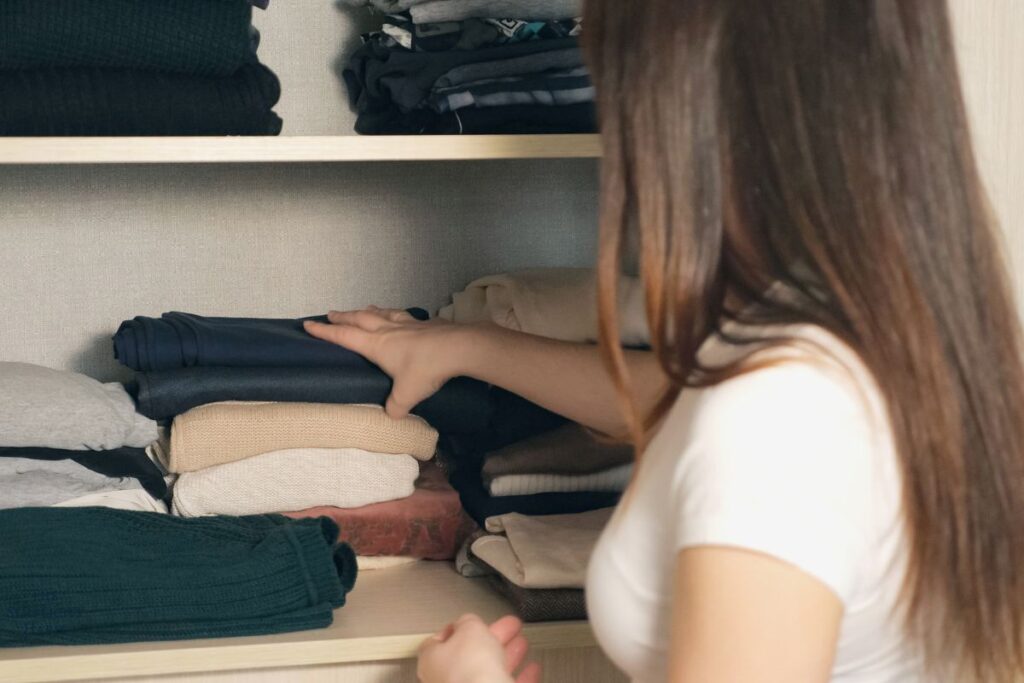
4. Find solutions that will work for you long-term.
Decluttering is a two-part project. First, you’ll get rid of all the existing clutter in your space. Then, you’ll want to create an organizational system for the stuff that remains – and figure out how to keep it from descending into cluttered chaos like it was.
Instead of rushing through this part of the process, it’s critical to pause and really put some thought into what’s going to work for you long-term.
By putting some thought into why certain spaces were so cluttered, you can come up with solutions that can mitigate those issues and set you up for success. That might mean not using a particular closet for storage that you can’t reach without assistance.
It could look like hanging storage solutions on walls – something visible that you can’t easily ignore or forget. Maybe it means filling drawers with organizers to make it easy to find and grab whatever you need – or exploring totally custom solutions best suited to support your particular situation.
As you might imagine, this looks a little different for everyone, depending on your space as well as your personal needs and limitations.
And if you live with others? It’s also important to get them on board and ensure they’re willing and able to support whatever solutions you put into place. Involve them in your decision-making process to get their buy-in, and it’ll be easier to ensure you can keep clutter at bay for the weeks and months to come.
Creating decluttering habits in your home will help you to maintain your space so that you can enjoy your simplified home where you can more easily relax.
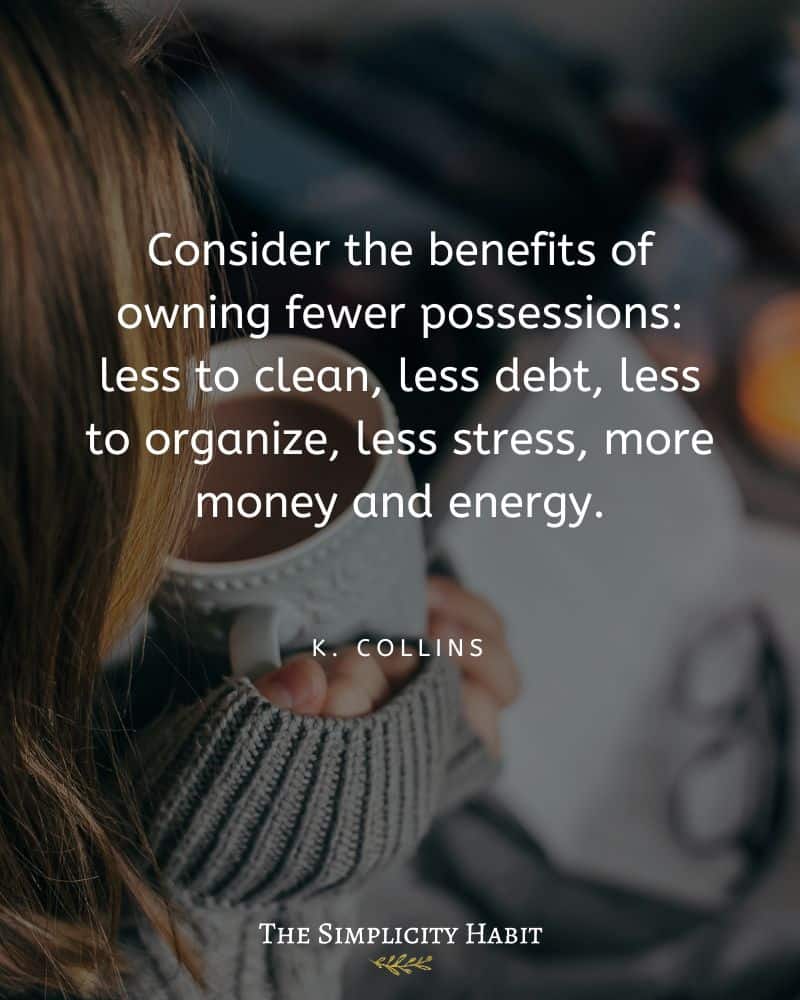
What tips and tricks have helped you declutter your space while facing health challenges? Comment here and let me know!
Sign up on the form below to get weekly decluttering tips and inspiration sent straight to your inbox. You’ll also get the free 5 Areas to Declutter in 10 Minutes Checklist to help you get started decluttering today.


I have chronic pain in my hands from arthritis. but, the more my head and hands are involved in decluttering, the less it hurts because my brain ignores the pain and focuses on what I’m doing instead.
This is an excellent article 👏! It’s exactly the approach that I use.
I don’t say I suffer from ADHD, I embrace it & make it work for me.
I can get easily bored with decluttering a room & find it difficult to get started because I mentally make it a bigger challenge than it actually is.
To change my mindset, I list every area of the room to declutter on a piece of paper numbered 1-12. I play a mind game of setting a timer for 5min. to see how much I can get done in each area! I find that by getting my momentum going, I keep going.
If I don’t feel well, I try to do something for just 5min.After all something done is better than nothing!
I have rooms/areas that are easily done in a day & others that I’m still working on years later. However, once I finish decluttering/organizing a room, I do keep it that way. I revisit every room each year & find more that I no longer need.
I do hire help for big projects when I feel overwhelmed & my husband & teenagers are always willing to help because they know it makes me very happy & less stressed.
My standards are definitely not Martha Stewart’s or even close to minimalist & that’s OK. I don’t need to live up to other people’s expectations.
I actually consider decluttering & organizing one of my favorite things to do & have helped many friends through the years with their own homes 🏡❤. I enjoy the group & your articles 😊. Thank you.
Your method of how you do it, is a SPECIFIC KEY that will WORK for me! Thank you for sharing.
I have a very bad back and knees which makes stooping or squatting impossible. I use a folding chair to sit on so I can reach things on the floor when cleaning out my closet floors or lower kitchen cabinets.
Thank you for being the first writer I have come across to acknowledge the challenge faced by people with additional health needs. I’ve been living well with cancer for 10 years but the treatments are exhausting and I have problems with my back. In the past, I’ve tried to declutter and ended up laid out because my back hurts and I have tired myself out. This year, it is my goal to complete what I have started so many times before but not managed to finish because I overdid it, wasn’t realistic enough. As you say, small steps are needed and I have figured out that it is a question of doing just enough to tip the balance the other way, towards taking more things out your house than you are putting in, and you will get there in the end!
Thank you for considering decluttering with health conditions and mental issues. I’ve been on dialysis 27+ years, heart conditions, Parkinson’s, and thyroid issues (not diabetic!!). I am so grateful to have my best friend help me every week on a day to declutter & sometimes cleaning when I just unable to keep up!!! Eventually we hope to hire someone to came in & clean every two weeks!!! Right now my girlfriend Karen & I meet once a week and declutter one space- a closet, bedroom, coat closet etc. then we go out & have some fun!! When we feel burnt out we schedule a day of fun!! We always go out & eat together always!!! I could never accomplish on my own what we do together!!! I’m so grateful for such a good friend!! It doesn’t mean it’s always easy for me to declutter!!! I find somethings I’m extremely sentimental about!! We just skip overt hose items & keep going!!!
I have been decluttering for years. I live with Lymphoedema and have swollen legs and feet and in pain 24/7. I now wear compression garments and at times restricted movement. I also use 2 walking canes so unable to carry much out. I pace myself and I take one area at a time. If I don’t use it, or love it, then it is easier to get rid of. I have taken much to the garage and on to charities. I could do with some of my clutter now as a family member’s house burned down 2 weeks ago from a faulty clothes dryer. She is a young woman with 3 young children. I have gotten the home to a happier and more minimal space to live in but some items hard to get rid of due to an attachment to these items. I am now ready to get rid of these items to this family who LOST EVERYTHING. They have nothing. Told by the firemen to get rid of all the clothes due to smoke damage. Can you imagine LOSING EVERYTHING YOU OWNED. It took a tragedy to help us all as a family to evaluate how many material possessions we need to live comfortable and what is excess. To be content and less materialistic. To learn to live with less. I am now in a position to donate the items I was holding on to and find it easier to live with less. We have all evaluated our shopping habits and realise the importance of FAMILY! Blessed to be ALIVE!.
I feel like this is written for me. Will surely try these tips from now on. Especially to take it easy and slow and not comparing with others.
Thank you
We are moving at the end of the month and need to get the decluttering done to move and put our for sale. My husband works 6 days a week. It is stressful, which doesn’t help my chronic pain either.
Thank you for the declutter advice.
I have been trying to do my closest.
This helps, however I started and I just can’t seem to stay motivated. I have problems with my back and neck.. It seems like I just get started and have to lie down to ease my pain..
I will try again and see how far I can get .
Thank you
Elizabeth
I had to realize that it is okay to take a day off from a big goal. No one but myself can impose a timeline on me. Tomorrow is another day, and quite likely won’t be so painful.–Anne
I’ve been suffering daily from Fibromyalgia and Myofacial pain for several years, and also the effects of diabetes neuropathy and cancer treatments from breast cancer(healed).
Every day I go through pain and can be anywhere on my body.
I’ve been trying to get organized and asked a family member for help, but they refuse. I’ve decided to try the 5 min. clean to see how I’ll do. If this doesn’t work I’ll talk to my Dr. to see if she can get me some help through Medicare.
Thank you in addressing this need.
I have to admit I’ve pretty much given up. I’m a 68-year-old senior with disabilities and am now suffering a long bout with COVID. I used to keep things clean, organized, and decluttered as I don’t really like extra “stuff. ” But between my health problems and living with a spouse and adult child who could care or do less, it’s worn me down after over 35 years. I’ve isolated in my bedroom for weeks now. I’m actually afraid of what I’ll find when I’m able to see the rest of the house. I wish I could afford a cleaning service. However, I’ve found they don’t like to work around this level of clutter. What to do?